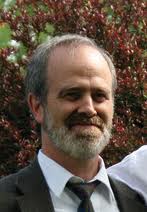Professor Terrence W. Deacon
Terrence W. Deacon, Ph.D. is Professor of Anthropology and member of the Cognitive Science Faculty at the University of California in Berkeley. His special interest is in Brain development and evolution, origins of language, bio-cultural evolution, and emergence. He is the Author of Incomplete Nature: How Mind Emerged from Matter and The Symbolic Species: The Coevolution of Language and the Brain.
Terry’s research has combined human evolutionary biology and neuroscience, with the aim of investigating the evolution of human cognition. His work extends from laboratory-based cellular-molecular neurobiology to the study of semiotic processes underlying animal and human communication, especially language. Many of these interests are explored in his 1997 book, The Symbolic Species: The Coevolution of Language and the Brain.
His neurobiological research is focused on determining the nature of the human divergence from typical primate brain anatomy, the cellular-molecular mechanisms producing this difference, and the correlations between these anatomical differences and special human cognitive abilities, particularly language. In pursuit of these questions he has used a variety of laboratory approaches including the tracing of axonal connections, quantitative analysis of regions of different species brains, and cross-species fetal neural transplantation. The goal is to identify elements of the developmental genetic mechanisms that distinguish human brains from other ape brains, to aid the study of the cognitive consequences of human brain evolution.
Terry’s theoretical interests include the study of evolution-like processes at multiple levels, including their role in embryonic development, neural signal processing, language change, social processes, and focusing on how these different processes interact and depend on each other. Currently, his theoretical interests have focused on the problem of explaining emergent phenomena, such as characterizing such apparently unprecedented transitions as the origin of life, the evolution of language, and the generation of conscious experience by brains.
He has long stated an interest in developing a scientific semiotics (particularly biosemiotics) that would contribute to both linguistic theory and cognitive neuroscience.
His 2011 book, Incomplete Nature: How Mind Emerged from Matter, explores the properties of life, the emergence of consciousness, the relationship between thermodynamic, self-organizing, evolutionary, and semiotic processes, and provides a new technical conception of information that explains both its representational and normative properties. The book speculates on how properties such as information, value, purpose, meaning, and end-directed behavior emerged from physics and chemistry.
His 1997 book The Symbolic Species: The Coevolution of Language and the Brain is widely considered a seminal work in the subject of evolutionary cognition. His approach to semiotics, thoroughly described in this book, is fueled by a career-long interest in the ideas of the late 19th-century American philosopher Charles Sanders Peirce and his theory of semiosis. In it, he uses the metaphors of parasite and host to describe language and the brain, respectively, arguing that the structures of language have co-evolved to adapt to their brain hosts.
In contrast to the arguments presented by Juarrero in Dynamics of Action (1999) and by Thompson in Mind in Life (2007), Terry explicitly rejects claims that living or mental phenomena can be explained by dynamical systems approaches. Instead, he argues that life- or mind-like properties only emerge from a higher-order reciprocal relationship between self-organizing processes.
Watch his lecture at The University of British Columbia about Language and Complexity. Watch and listen to the interview with Terry by The Dissenter part 1 and part 2. Watch Emergence and Reduction: Terrence Deacon, Terrence W. Deacon. Neither nature nor nurture: the semiotic basis of language universals, and Terrence W. Deacon on Incomplete Nature radically reformulating the concept of emergence.
Visit his Berkeley profile and his Wiki page. Read his ResearchGate profile. View the list of his publications at Neurotree, dblp, and PhilPeople.





